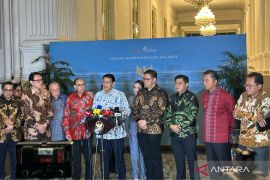The tragedies arising from escalating geopolitical rivalry and geoeconomic fragmentation are partially linked to the effects of war and conflict, as well as the challenges posed by global warming and climate change.
As Israel's ongoing genocidal campaign, which resulted in the deaths of over 46 thousand Palestinians in the Gaza Strip, continues toward the end of 2024, the world also witnessed aviation incidents in Kazakhstan, Canada, Norway, and South Korea.
In a "Que sera, sera" scenario, Indonesia, like many nations, must focus on preparedness, acknowledging that while the future is uncertain, proactive measures are essential to navigate both expected and unexpected challenges in the year ahead.
In light of the regional and global dynamics, Indonesia must prepare for at least five issues that will have both direct and indirect impacts in 2025.
Speaking to ANTARA here on Monday, Muhammad Teguh Ariffaiz Nasution, a defense analyst from Horizon, pointed out several significant issues.
The first matter of concern is the escalating rivalry between the US and China. Given Indonesia's location in the Indo-Pacific region, Nasution opined that the Indonesian Government cannot ignore its implications. In this regard, Donald Trump, who recently defeated Kamala Harris in the U.S. presidential election, is set to take office in January 2025. His return is likely to have significant implications for U.S.-China relations.
Nasution noted that Trump initiated the U.S.-China trade war in 2018. With his return to power, Indonesia may face a worsening trade conflict, a possibility the country must carefully consider.
With a demanding president like Trump in the White House, Indonesia will likely be required to take more decisive steps to maintain a balanced relationship with both the United States and China.
Related news: Sri Mulyani says Indonesia anticipates Trump's protectionist policies
Second, the situation regarding Taiwan remains critical. China has never ruled out the use of force to bring Taiwan under its control, and President Xi Jinping has instructed the People's Liberation Army (PLA) to prepare for a potential invasion by 2027.
While this does not guarantee an invasion by 2027, Nasution views it as a clear sign of China's commitment to preparing its military for the potential use of force over Taiwan.
There is indeed a risk of conflict between the U.S.-China alliances and China over Taiwan, which may have significant implications for Indonesia.
Nasution, who earned his master's degree in strategic studies from the Australian National University (ANU), highlighted that Indonesia occupies a strategic position along vital global maritime sea lanes that could be contested in the event of a U.S.-China war.
In this context, Indonesia must determine how to respond as a neutral country.
He emphasized the need for Indonesia to keep any conflict outside of its territorial waters. To achieve this, Indonesia must prepare both diplomatically and militarily for such scenarios.
Furthermore, if a war erupts in Taiwan, the fate of over 280 thousand Indonesian citizens (WNIs) residing there will be at risk. The government must earnestly develop contingency plans for their evacuation.
Friend and potential foe
Third, South China Sea/North Natuna Sea. Throughout 2024, Nasution drew attention to the increasing tensions in the South China Sea, particularly between China and the Philippines.
China's aggressive actions against the Philippine government's vessels carrying out supply missions within its Exclusive Economic Zone (EEZ) should serve as alarm bells for Indonesia, according to him. Indonesia must consider how it should respond if subjected to the same treatment by China, especially as its coast guard regularly intrudes upon Indonesia's EEZ in the North Natuna Sea.
It is worth noting that one notable intrusion occurred just a few days after Prabowo Subianto's inauguration as Indonesia's eighth president on October 20, 2024.
"This should serve as a reminder. Even though Indonesia and China maintain close economic relations, China also is a potential threat to Indonesia in the Natuna," Nasution said.
With that in mind, he emphasized the need for Indonesia to base its engagement with China regarding the Natuna/South China Sea in accordance with UNCLOS 1982.
He argued that Indonesia should steadfastly uphold UNCLOS and reject any agreements with China that do not align with its provisions.
Related news: Cooperation with China not to affect sovereignty in North Natuna: Govt
Fourth, the ongoing Russia-Ukraine war. In this context, the war, which has led to numerous global repercussions, including supply chain disruptions and increased global instability, is approaching its third year.
Hence, he suggested that Indonesia should take into account the implications of the war going into 2025 and beyond, including the possible global ramifications of a Ukrainian/Russian defeat or a further escalation of the conflict, including the direct involvement of additional countries in the war, such as North Korea or even NATO countries.
Fifth, the situation in the Middle East. The conflict between Israel and Palestine over Gaza continues to persist. In light of this reality, Indonesia must maintain its unwavering support for Palestine and condemn Israel's aggression.
Nasution noted that the conflict over Gaza has also led to regional escalation, as evidenced by Israel's invasion of Lebanon, which has resulted in injuries to several UNIFIL Peacekeepers, including those from Indonesia.
He said that the regional escalation was also characterized by missile strikes between Israel and Iran, which posed a significant threat of a broader regional war; additionally, the Houthi blockade of the Red Sea has resulted in substantial global trade disruptions, leading to increased costs.
All of these conflicts are expected to continue well into 2025.
Nasution recommended that Indonesia consider the global ramifications of these conflicts, including the risk of broader escalations that could lead to further disruptions in global supply chains and increased prices for energy and commodities.
Related news: Double standards in Gaza damaging multilateral system: RI
Editor: Tia Mutiasari
Copyright © ANTARA 2024











